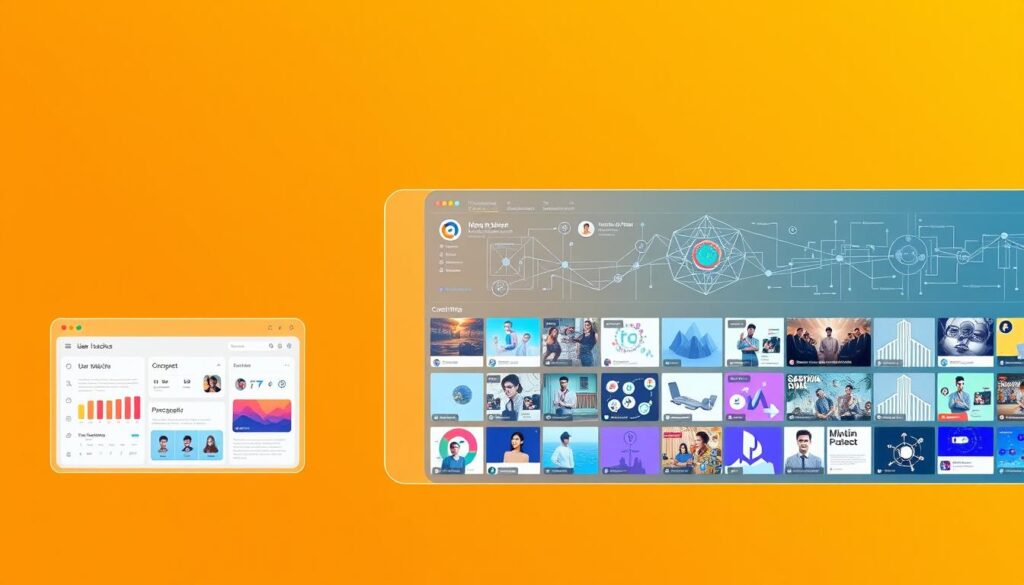Ever wondered how some brands seem to know you better than you know yourself? Today, companies use advanced machine learning to make content that fits your unique tastes and actions. They have a lot of data from online sources, giving them insights they never had before.
Machine learning algorithms do more than just look at past data. They change how we experience things by using real-time data and predictions. This makes content more targeted and engaging.
As we explore this new world, it’s key to see how these technologies change how brands talk to us. They move from general messages to ones that really speak to us, leading to better results. This article looks at how machine learning helps create content that not only attracts customers but also keeps them coming back.
Key Takeaways
- Machine learning algorithms enhance accuracy in data analysis and consumer targeting.
- Companies utilizing machine learning report significantly higher conversion rates.
- Personalization can dramatically increase customer engagement and satisfaction.
- Real-time adjustments to campaigns can maximize effectiveness based on predictive analytics.
- Advanced AI tools allow businesses to leverage vast amounts of consumer data for deeper insights.
Understanding Machine Learning and Its Impact on Content Personalization
Machine learning is a big step forward in technology. It uses algorithms and statistical models to improve performance on specific tasks. This tool is key in content personalization, helping companies create experiences that fit each user’s needs.
By analyzing user behavior and preferences, businesses can make their content more engaging. This means they can offer experiences that are truly relevant to each individual.
Defining Machine Learning and Its Scope
Machine learning is a core part of artificial intelligence. It focuses on creating systems that can learn from data. Unlike traditional programming, this learning happens automatically.
In content personalization, machine learning uses user data to create tailored experiences. This changes how people interact with digital platforms, making it more personal.
How Machine Learning Transforms User Experiences
Machine learning uses advanced algorithms to improve user experiences. It tailors interactions based on how users interact with websites. This can include suggesting products, adjusting layouts, or showing targeted ads.
This level of customization makes browsing more relevant. It also leads to higher engagement and better conversion rates. This shows how crucial machine learning is in today’s digital marketing.

Machine Learning Algorithms in Marketing
Machine learning algorithms are key in making content personal and improving marketing plans. They help businesses understand user data, making better choices and improving customer experiences. Knowing how these algorithms work lets marketers create content that really speaks to their audience.
Types of Algorithms Used for Personalized Content
Many machine learning algorithms are used to make content personal. Here’s a table showing some important ones and how they’re used in marketing:
| Algorithm Type | Application |
|---|---|
| Collaborative Filtering | Uses user behavior to suggest personalized products or content. |
| Decision Trees | Makes decisions based on user data, making content more relevant. |
| Neural Networks | Looks at lots of data to find patterns for personalized experiences. |
| Clustering Algorithms | Finds groups of users for targeted content delivery. |
Real-Time Data Processing for Content Optimization
Being able to use user data right away makes content better. Machine learning lets marketers change strategies fast based on what users do now. This leads to content that really grabs users’ attention and boosts chances of them taking action.

Personalized Marketing AI, Machine Learning in Marketing, Content Targeting
Personalized marketing AI and machine learning in marketing are powerful tools. They help businesses reach consumers with content that really speaks to them. This technology lets companies analyze data better, making messages that engage and convert more people. By using AI, marketers can keep up with the fast pace of the market.
Combining AI and Machine Learning for Enhanced Marketing Strategies
AI and machine learning together create advanced marketing plans. These systems quickly look through lots of data, helping marketers improve their strategies. In fact, 91% of people like it when brands remember them and offer things that fit their interests.
Using these methods, businesses can work more efficiently. They can see a return on investment that’s 5-8 times what they spend.
Utilization of Consumer Data for Tailored Messaging
Good personalized marketing uses consumer data well. Marketers look at what customers buy and what they browse to make messages that fit their needs. A big 63% of marketers say personalization boosts their conversion rates.
Also, brands that target their messages well can see a 20% jump in sales. Using machine learning can cut down on how much it costs to get new customers by 50%. This shows how important it is to use data to make marketing personal.

The Benefits of Using Machine Learning for Personalization
Using machine learning for personalization brings many benefits, especially in making user experiences better. Businesses that use these technologies see big improvements in how users interact with them. They can tailor content and offers to what each customer likes, making interactions more meaningful.
Increased Engagement and Conversion Rates
Machine learning helps brands make content and offers that really speak to users. Since 63% of consumers want personalized marketing, those who don’t risk losing customers. Personalized marketing boosts engagement and leads to more sales.
Companies that get this right see their sales go up. Customers feel more connected to messages and products that are made just for them.
Enhanced Customer Insights Through Data Analytics
Data analytics is key to understanding what customers like and want. Machine learning makes it fast to analyze big data, giving insights that lead to action. By looking at past behavior, businesses can predict how customers will react to different campaigns.
This deep understanding helps improve marketing strategies. It leads to stronger customer relationships and higher satisfaction rates.

Real-World Applications of Machine Learning in Personalized Content
Machine learning is key in making content personal across many fields. It makes user experiences better and helps businesses grow. Companies in Asia and top e-commerce sites show how machine learning changes things for the better.
Examples from Successful Asian Companies
Asian companies use machine learning to change how they talk to customers. Sites like Lazada and Shopee use smart tools to guess what users like. They look at what users do and suggest products that fit their tastes.
This approach makes users happier and helps businesses sell more. It also keeps customers coming back for more.
Case Study: E-commerce Platforms and Recommendation Systems
Big e-commerce sites lead the way in using machine learning. They use smart systems to suggest products based on what users have looked at and bought. This makes shopping more fun and personal.
These systems change what they suggest based on what users do right away. This leads to more people buying things and being happy with their shopping experience. Many e-commerce sites see their sales go up because of this.
The Future of Personalization with Machine Learning
Machine learning is changing how we personalize marketing. The future will bring new ways to deliver content that makes users happy. Companies need to keep up with these changes to meet customer needs.
Emerging Trends in AI-Powered Content Delivery
AI is making content delivery better with natural language processing and chatbots. The market for conversational AI is growing fast, from $7 billion in 2021 to over $18 billion by 2026. This means brands can offer more interactive and fun experiences for customers.
Most people, 71%, want personalized interactions from companies. But, 76% get frustrated when they don’t get it. This shows how important it is for businesses to focus on personalization. Using AI can make customers happier and increase sales by up to 15%.
Predictions for Personalized Marketing Evolution
Marketing is moving towards more detailed personalization. Companies will use advanced analytics to understand what customers want. They will also keep customer data safe.
AI can make targeted promotions better, leading to more sales and happy customers. Using generative AI for content can make things 50 times faster. AI in email marketing has also shown big improvements in how people engage with emails.
As marketing gets more personal, AI will play a key role. It will help businesses create campaigns that really speak to their audience.
Ethical Considerations in Machine Learning for Personalization
Companies are using machine learning for personalized marketing more and more. This raises big ethical questions. Data privacy and algorithm bias are key issues. They affect how much people trust brands and keep them honest.
Data Privacy and Consumer Trust
AI systems collect a lot of data, which raises big ethical worries. Many people worry about their personal info being used without asking. A McKinsey report says 50% of people want companies to only ask for data they really need.
Laws like GDPR and CCPA try to protect user data. But, data breaches still happen, putting sensitive info at risk. It’s vital to have strong data security and let users control their data. This helps follow the law and build trust with customers.
Avoiding Bias in Algorithms
Algorithm bias is another big ethical problem in machine learning. Badly made algorithms can make things worse by showing bias. This can unfairly target people based on things like gender or age.
Studies show biased algorithms can make targeting less accurate for different groups by up to 30%. Regular checks and fairness metrics can spot and fix biases in AI. Tools like LIME and SHAP help make AI decisions clearer. This keeps brands honest and respected.
Challenges in Implementing Machine Learning for Personalized Content
Using machine learning for personalized content comes with its own set of hurdles. Companies often struggle to implement it because of the need for advanced tech and skilled people. It’s key for businesses to understand these challenges to thrive in the fast-changing digital marketing world.
Technical Barriers to Effective Implementation
Setting up machine learning can hit technical roadblocks. Small businesses might find it hard to build the right tech setup, like strong data storage and processing. A solid tech base is essential for running complex algorithms and analyzing data well.
Without the right tech, companies might not get the most out of machine learning. This could lead to issues in delivering personalized content effectively.
The Need for Expertise in Machine Learning
For machine learning to work in personalized content, a team with the right skills is crucial. Finding people with the needed machine learning knowledge can be tough for companies. This lack of skills makes it hard to analyze data and create algorithms that fit their needs.
Companies need to focus on hiring experts or training their teams. The skills of data scientists and machine learning experts are vital. They help overcome the hurdles and make personalization better.
Conclusion
Marketing is changing fast, and machine learning is key to making content personal. With 69.1% of marketers using AI, they’re not just keeping users interested. They’re also getting ready for more advanced marketing plans.
Personalized emails, for example, can lead to six times more sales. This shows how important it is to tailor messages to each person.
The AI marketing market is expected to hit $40 billion by 2024. This means companies using machine learning will have an edge. But, they must also think about ethical issues like privacy and following rules.
41% of CMOs see these as big challenges. It’s crucial to be open and honest about AI use to keep customers happy.
In short, machine learning is changing marketing in big ways. It’s affecting everything from suggestions to how we connect with customers. Companies that invest in machine learning will get better at marketing and be ready for the future.
For more info, check out essential AI terms that can help you use AI better in your marketing.

